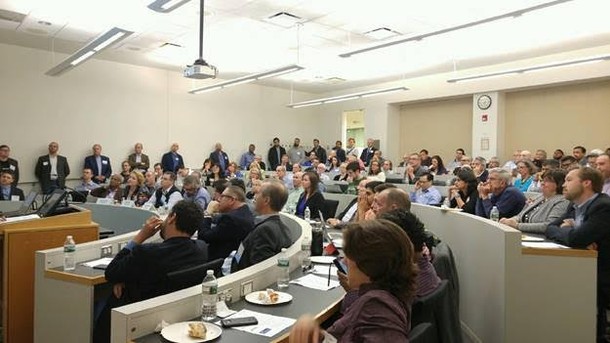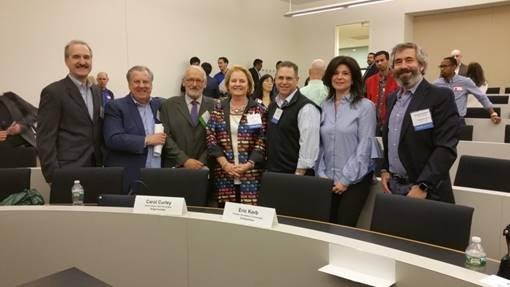NJ-Based Startups Fluidsens and iSport360 Win Third TechLaunch BullPen Event

Four New Jersey startups participated in the third BullPen pitch competition, which was hosted by TechLaunch (Kinnelon) at Princeton University on April 19, in conjunction with the Princeton Tech Meetup.
Mario Casabona, TechLaunch founder and CEO, reflected on the history of TechLaunch and the reasons the organization has pivoted from an accelerator model to a business coaching and mentoring model.
By the end of the three-year run of the TechLaunch startup accelerator, which operated from 2011 to 2014, Casabona “realized that the quality of the deal flow was not in New Jersey. … The objective here is to improve the quality of the deal flow. What is amazing is that the talent is in New Jersey. We have to somehow get the startups to stay in New Jersey and not go outside” of the state.
TechLaunch now seeks companies that are post-seed and, through coaching and mentoring, takes them to a stage where they will be ready for an angel round. Angels have “gone more upstream, closer to VCs,” so TechLaunch tries to fill that gap, said Casabona.
Four companies — Slope (Princeton), Vognition (Oakland), iSport360 (Manalapan) and Fluidsens International (Washington Township) — presented to a standing-room-only audience made up of Princeton Tech Meetup members, angel investors, educators and tech startup founders.

Eric Korb, Gina Tedesco, & George Abraham | Courtesy TechLaunch
The judges were George Abraham, founder and CEO of Rhodium Strategies (Montclair), an investment and consulting firm serving emerging growth companies; Carol Curley, an angel investor and managing director at the investment firm Golden Seeds (New York); Eric Korb, angel investor and founder of Accreditrust Technologies (Warren), from which he recently exited.; and Gina Tedesco, angel investor and a member of the board of JumpStart NJ Angel Network .
The investor panel named Fluidsens the winner of the competition, and the attendees voted via their smartphones for iSport360 as the audience choice.

Fluidsens “has the only system in the world that can detect contamination in water in real time and send an alarm and notices to customers letting them know about it,” said presenter Gideon Vardi. The technology, developed in Israel, detects both organic material and metals. “Right now, water is tested by taking samples,” and results are not available immediately. Only one company, GE, is also in this business, but their systems are only used at laboratories, require maintenance for cleaning and are not that sensitive, Vardi added.
The Fluidsens systems are designed to be used onsite and they clean themselves, he said. The systems are made mostly with off-the-shelf components, he noted, except for the company’s proprietary technology that allows the systems to find fewer than 10 particles in a million.
Fluidsens’ margins and growth predictions came in for some scrutiny from the judges, who clearly thought that the numbers were way off. Tedesco noted that it seemed as if Vardi wasn’t asking for enough money to scale the business, given that he was only asking for $500 at first and $1.5 million total. Also, she was skeptical of the $800 manufacturing cost presented by Vardi. Another judge said that revenue predictions were off. “If you were going to have $300 million in EBITA [earnings before interest, taxes, and amortization] in three years, I would mortgage my house not to take money from anyone,” he said.

Ian Goldberg, founder and CEO of iSports360 noted that he is a dad, a youth sports coach and a founder of iSport360. “We are helping 100 million kids and their sports parents get better feedback from their coaches.” Almost all sports parents think their children are scholarship material, but they often have unrealistic expectations about their children’s ability. “To be fair, coaches don’t have the time or the tools to give parents feedback.”
The iSport360 app, launched a year ago, gives coaches and kids a very well-defined, objective set of goals at the beginning of the sports season, based on their sport, their age, their gender and whether they travel with a team or are recreational players. The goals were developed by experts in each sport and are based on youth sports governing-body guidelines. The app also has a player evaluation tool. “Parents are very cynical about any evaluation that a coach gives to their kids. We wanted to remove the politics and whether or not the coach likes the kid or not.” The evaluation tool always consists of 10 questions focusing on specific skills, and it only takes about 90 seconds to complete, he said.
Goldberg spoke about his company’s marketing strategy, which involved the creation of a popular email newsletter that now has more than 100,000 subscribers. This has allowed the startup founder to become a thought leader in youth sports. The startup is also partnering with big companies in the sports world and talking to professional sports teams that have community outreach, so they can “spread the word.” Goldberg said that he had been interviewed on WFAN and SiriusXM. The company is now working on a paid version of the app that it will offer to parents for $2.99 for the entire playing season, no matter how many kids there are in a family or how many teams they play on.
Goldberg suggested that iSport360 had numerous exit opportunities, since there are four major sports players who are buying up sports apps: Sports Illustrated, Jerry Jones, owner of the Dallas Cowboys, Dick’s Sporting Goods and NBC Sports. [On June 1, iSport360 announced that Howie Roseman, the executive vice president of football operations for the Philadelphia Eagles, has become its newest investor and board advisor.]
The judges asked about the foundations of the idea for iSport360 . One of them said that he was a former youth coach and wouldn’t have wanted his evaluations in writing. However, he could see this working well for travel teams, where there is an emphasis on skill building. Another judge ventured the opinion that the business model needed to change. Goldberg responded, “For us to be highly valued, we need to be a software company. If we are a media company, our valuations are a lot lower, so we are trying to focus on a [software] subscription model that is incredibly scalable and can grow virally.”

Also presenting was Michael Liguori, founder and CEO of Vognition, who has developed high-level natural language voice controls for smart home products. “What we really are is a home voice IoT portal solution to the manufacturers of smart home hubs. … They need something that they can get quickly to market, that they don’t have to worry about committing resources, that they can use and keep their software team small. … They want to stay a hardware company.” Vognition has two customers, one which has been announced, and the company has generated revenue this year.
Vognition was not raising money at the time of the pitch. Liguori said that his next steps would be to develop a sales team to approach the over 200 manufacturers who could use his product. “For 2017 we want ten new relationships … generating six figures in revenues,” he said.
The judges said that they would have preferred to see a more fluid slide deck and more information on the market. They also thought it would be a good idea to go into more detail about the startup’s team. One judge suggested a demo of the product during the pitch, another suggested a visual representation to show how the B2B product fits into the smart home ecosystem.
Joshua Collins pitched Slope, a student startup out of Princeton (where he was a senior) that wants to give everyday people access to a variety of algorithmic investing methods. “We are trying to solve a problem. People are bad at investing … and currently municipal funds don’t do much better than the market.”
He noted that Slope will be a low-fee, easy-to-use platform that will enable “everyday people to use algorithmic trading, and let the algorithms do the work.” They won’t be hindered by their lack of investment knowledge, he said. The target market for Slope is young professionals, who are most likely to adapt to a new and different investment strategy. One of the algorithms is currently being tested going back five years, he said, but the idea is to develop an array of algorithms people can use, depending on their aversion to risk.
In response to a question from an audience member, Collins acknowledged that the first algorithm developed by the team hadn’t been backtested to see if it would work in a down market. That was because it was based on a particular trading methodology called “VIX” (a measure of stock market volatility), which wasn’t available in 2007- 2008 when the U.S. slid into recession and stocks tumbled. Given that the team now consists of computer science majors, some of whom have had experience in the financial world, audience members thought that they should bring in advisers or team members with more experience.

